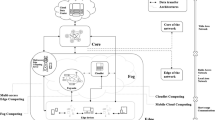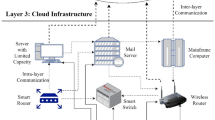Abstract
In the present era of seamless connectivity which demands enormous smart devices to be allied and send data to the cloud, it seems imperative to organize and process cloud-based smart Internet of Things (IoT) applications in real time. Hence, to support the continuous demand for the scheduling of real-time latency-sensitive tasks; the adaptability of fog computing is necessary which provide close adjacency to the tasks generating sources. Fog computing ensures optimal scheduling of latency-sensitive tasks by appropriate resource allocation considering dynamic user requirements. But the process of scheduling is an open challenge due to limited availability and processing capacity of fog resources. Further, provisioning of an appropriate fog resource is also necessary for timely execution of tasks. Hence, the papers present a novel task-scheduling heuristic algorithm; Matrix-based Task-Fog Pairing (MTFP) that aim to provide a feasible solution for fog resource provisioning to latency sensitive tasks. The algorithm worked on two different matrixes called compatibility and execution time matrix for scheduling priority tasks in order to achieve the desired Quality of Experience (QoE) to the end-user. Finally, the proposed algorithm MTFP is compared with the present state-of-the-art and shown improvement in term of reducing tasks execution time by 18%, delay by 16% and energy consumption by 14.5%.










Similar content being viewed by others
Data availability
All data generated or analysed during this study are included in this article.
References
Hurbungs V, Bassoo V, Fowdur T (2021) Fog and edge computing: concepts, tools and focus areas. Int J Inf Technol 13:511–522
Heidari A, Navimipour NJ, Otsuki A (2024) Cloud-based non-destructive characterization. Non-destructive material characterization methods. Elsevier, Amsterdam, pp 727–765
Manihar S, Patel R, Agrawal S (2024) A survey on mission critical task placement and resource utilization methods in the IoT fog-cloud environment. Recent trends in computational sciences. CRC Press, Boca Raton, pp 284–290
Singh S, Vidyarthi DP (2023) Fog node placement using multi-objective genetic algorithm. Int J Inf Technol 16:713–719
Arora U, Singh N (2021) IoT application modules placement in heterogeneous fog-cloud infrastructure. Int J Inf Technol 13(5):1975–1982
Wang Z, Goudarzi M, Gong M, Buyya R (2024) Deep reinforcement learning-based scheduling for optimizing system load and response time in edge and fog computing environments. Future Gener Comput Syst 152:55–69
Choppara P, Mangalampalli S (2024) An effective analysis on various task scheduling algorithms in fog computing. EAI Endorsed Trans Internet Things. https://doi.org/10.4108/eetiot.4589
Rani M, Guleria K, Panda SN (2024) Unleashing the power of QoS: a comprehensive study and evaluation of services-based scheduling techniques for fog computing. Int J Intell Syst Appl Eng 12(4s):388–405
Azizi S, Shojafar M, Abawajy J, Buyya R (2022) Deadline-aware and energy-efficient IoT task scheduling in fog computing systems: a semi-greedy approach. J Netw Comput Appl 201:103333
Krivic P, Kusek M, Cavrak I, Skocir P (2022) Dynamic scheduling of contextually categorised internet of things services in fog computing environment. Sensors 22(2):465
AL-Amodi S, Patra SS, Bhattacharya S, Mohanty JR, Kumar V, Barik RK. Meta-heuristic algorithm for energy-efficient task scheduling in fog computing. In Recent Trends in Electronics and Communication: Select Proceedings of VCAS 2020,Springer Singapore: pp 915-925
Martinez I, Hafid AS, Jarray A (2020) Design, resource management, and evaluation of fog computing systems: a survey. IEEE Internet Things J 8(4):2494–2516
Geetha J, DS JL, LN KN (2022) Consistent hashing and real-time task scheduling in fog computing. In: Deep learning applications for cyber-physical systems, IGI Global, pp 245–261
Talaat FM, Ali HA, Saraya MS, Saleh AI (2022) Effective scheduling algorithm for load balancing in fog environment using CNN and MPSO. Knowl Inf Syst 64:1–25
Singh J, Singh P, Hedabou M, Kumar N (2023) An efficient machine learning-based resource allocation scheme for SDN-enabled fog computing environment. IEEE Trans Veh Technol 72:8004–8017
Sharma O, Rathee G, Kerrache CA, Herrera-Tapia J (2023) Two-stage optimal task scheduling for smart home environment using fog computing infrastructures. Appl Sci 13(5):2939
Saif FA, Latip R, Hanapi Z, Shafinah K (2023) Multi-objective grey wolf optimizer algorithm for task scheduling in cloud-fog computing. IEEE Access 11:20635–20646
Faraji-Mehmandar M, Jabbehdari S, Javadi HHS (2023) Fuzzy q-learning approach for autonomic resource provisioning of IoT applications in fog computing environments. J Ambient Intell Human Comput 14:1–19
Ogundoyin SO, Kamil IA (2023) Optimal fog node selection based on hybrid particle swarm optimization and firefly algorithm in dynamic fog computing services. Eng Appl Artif Intell 121:105998
Abu-Amssimir N, Al-Haj A (2023) A QoS-aware resource management scheme over fog computing infrastructures in IoT systems. Multimedia Tools Appl 82:1–20
Zare M, Sola YE, Hasanpour H (2023) Towards distributed and autonomous IoT service placement in fog computing using asynchronous advantage actor-critic algorithm. J King Saud Univ Comput Inf Sci 35(1):368–381
Sharma P, Gupta P (2023) Optimization of IoT-fog network path and fault tolerance in fog computing based environment. Procedia Comput Sci 218:2494–2503
Bian M, Liu JK, Sun S, Zhang X, Ren Y (2023) Verifiable privacy-enhanced rotation invariant LBP feature extraction in fog computing. IEEE Trans Ind Inf 11:1719–1731
Kumar MS, Karri GR (2023) EEOA: cost and energy efficient task scheduling in a cloud-fog framework. Sensors 23(5):2445
Maatoug A, Belalem G, Mahmoudi S (2023) A location-based fog computing optimization of energy management in smart buildings: DEVS modeling and design of connected objects. Front Comput Sci 17(2):172501
Haseeb K, Alzahrani FA, Siraj M, Ullah Z, Lloret J (2023) Energy-aware next-generation mobile routing chains with fog computing for emerging applications. Electronics 12(3):574
Namane S, Ahmim M, Kondoro A, Dhaou IB (2023) Blockchain-based authentication scheme for collaborative traffic light systems using fog computing. Electronics 12(2):431
Gupta S, Singh N (2023) Toward intelligent resource management in dynamic fog computing-based internet of things environment with deep reinforcement learning: A survey. Int J Commun Syst 36(4):5411
Chakraborty C, Othman SB, Almalki FA, Sakli H (2023) FC-SEEDA: fog computing-based secure and energy efficient data aggregation scheme for internet of healthcare things. Neural Comput Appl 36:1–17
Gowda NC, Bharathi Malakreddy A (2023) BPCPR-FC: blockchain-based privacy preservation with confidentiality using proxy reencryption and ring signature in fog computing environments. Int J Inf Technol 15(6):3343–3357
Kaur J, Kumar R, Agrawal A, Khan RA (2023) A neutrosophic AHP-based computational technique for security management in a fog computing network. J Supercomput 79(1):295–320
Patil RY, Patil YH, Kachhoria R, Lonare S (2022) A provably secure data sharing scheme for smart gas distribution grid using fog computing. Int J Inf Technol 14(6):2927–2939
Sendhil R, Amuthan A (2021) Contextual fully homomorphic encryption schemes-based privacy preserving framework for securing fog-assisted healthcare data exchanging applications. Int J Inf Technol 13(4):1545–1553
Rani S, Srivastava G et al (2024) Secure hierarchical fog computing-based architecture for industry 5.0 using an attribute-based encryption scheme. Expert Syst Appl 235:121180
Mohamed AA, Abualigah L, Alburaikan A, Khalifa HAE-W (2023) AOEHO: a new hybrid data replication method in fog computing for IoT application. Sensors 23(4):2189
Gowri V, Baranidharan B (2023) Multi objective hybrid load balancing based optimization algorithm for improving fog computing performance
Sethi V, Pal S (2023) FedDOVe: a federated deep Q-learning-based offloading for vehicular fog computing. Future Gener Comput Syst 141:96–105
Mattia GP, Beraldi R (2023) P2PFaaS: a framework for FaaS peer-to-peer scheduling and load balancing in fog and edge computing. SoftwareX 21:101290
Tripathy SS, Mishra K, Roy DS, Yadav K, Alferaidi A, Viriyasitavat W, Sharmila J, Dhiman G, Barik RK (2023) State-of-the-art load balancing algorithms for mist-fog-cloud assisted paradigm: a review and future directions. Arch Comput Methods Eng 30:2725–2760
Archana R, Pradeep Mohan KK (2023) Fog offloading and scheduling in traffic monitoring system by deep reinforcement. Adv Sci Technol 124:809–816
Kaur N, Kumar A, Kumar R (2022) TRAP: task-resource adaptive pairing for efficient scheduling in fog computing. Clust Comput 25(6):4257–4273
Kaur N, Kumar A, Kumar R (2022) PROMO: PROactive mobility-support model for task scheduling in fog computing. Int J Comput Appl 44(11):1092–1101
Potu N, Bhukya S, Jatoth C, Parvataneni P (2022) Quality-aware energy efficient scheduling model for fog computing comprised IoT network. Comput Electr Eng 97:107603
Yadav AM, Tripathi KN, Sharma S (2022) An opposition-based hybrid evolutionary approach for task scheduling in fog computing network. Arab J Sci Eng 48:1547–1562
Lakhan A, Memon MS, Elhoseny M, Mohammed MA, Qabulio M, Abdel-Basset M et al (2022) Cost-efficient mobility offloading and task scheduling for microservices IoVT applications in container-based fog cloud network. Clust Comput 25(3):2061–2083
Zhou M-T, Ren T-F, Dai Z-M, Feng X-Y (2022) Task scheduling and resource balancing of fog computing in smart factory. Mob Netw Appl 28:19–30
Farkar FE, Kazem AAP (2017) Bi-objective task scheduling in cloud computing using chaotic bat algorithm. Int J Adv Comput Sci Appl. https://doi.org/10.14569/IJACSA.2017.081029
Yadav AM, Tripathi KN, Sharma SC (2022) An enhanced multi-objective fireworks algorithm for task scheduling in fog computing environment. Clust Comput 25(2):983–998
Islam MSU, Kumar A (2022) CaPTS scheduler: a context-aware priority tuple scheduling for fog computing paradigm. Trans Emerg Telecommun Technol 33:4647
Sharif Z, Jung LT, Ayaz M, Yahya M, Pitafi S (2023) Priority-based task scheduling and resource allocation in edge computing for health monitoring system. J King Saud Univ Comput Inf Sci 35(2):544–559
Jamil B, Ijaz H, Shojafar M, Munir K (2023) IRATS: a DRL-based intelligent priority and deadline-aware online resource allocation and task scheduling algorithm in a vehicular fog network. Ad Hoc Netw 14:103090
Tuli S, Gill SS, Xu M, Garraghan P, Bahsoon R, Dustdar S, Sakellariou R, Rana O, Buyya R, Casale G et al (2022) HUNTER: AI based holistic resource management for sustainable cloud computing. J Syst Softw 184:111124
Iftikhar S, Ahmad MMM, Tuli S, Chowdhury D, Xu M, Gill SS, Uhlig S (2023) HunterPlus: AI based energy-efficient task scheduling for cloud-fog computing environments. Internet Things 21:100667
Siyadatzadeh R, Mehrafrooz F, Ansari M, Safaei B, Shafique M, Henkel J, Ejlali A (2023) ReLIEF: a reinforcement learning-based real-time task assignment strategy in emerging fault-tolerant fog computing. IEEE Internet Things J 10:10752–10763
Khattak HA, Arshad H, ul Islam S, Ahmed G, Jabbar S, Sharif AM, Khalid S (2019) Utilization and load balancing in fog servers for health applications. EURASIP J Wirel Commun Netw 2019(1):1–12
Gupta H, Vahid Dastjerdi A, Ghosh SK, Buyya R (2017) iFogSim: a toolkit for modeling and simulation of resource management techniques in the internet of things, edge and fog computing environments. Softw Pract Exp 47(9):1275–1296
Kargahi M, Movaghar A (2006) A method for performance analysis of earliest-deadline-first scheduling policy. J Supercomput 37:197–222
Hwang M, Choi D, Kim P (2011) Least slack time rate first: an efficient scheduling algorithm for pervasive computing environment. J Univers Comput Sci 17(6):912–925
Ibrahim M. Dataset for task scheduling in cloud using CLoudSim. https://doi.org/10.21227/px5b-b729
Kim H-Y (2014) Analysis of variance (ANOVA) comparing means of more than two groups. Restor Dent Endod 39(1):74–77
Funding
No funding was received for conducting this study.
Author information
Authors and Affiliations
Corresponding author
Ethics declarations
Conflict of interest
We have no conflicts of interest to disclose.
Ethical statement
We testify that this manuscript has not been published is whole or partial elsewhere. The manuscript is not currently being considered for publication in any other journal. Finally, all authors have been equally and actively involved in substantive work leading to the manuscript.
Rights and permissions
Springer Nature or its licensor (e.g. a society or other partner) holds exclusive rights to this article under a publishing agreement with the author(s) or other rightsholder(s); author self-archiving of the accepted manuscript version of this article is solely governed by the terms of such publishing agreement and applicable law.
About this article
Cite this article
Kaur, N., Mittal, A. MTFP: matrix-based task-fog pairing method for task scheduling in fog computing. Int. j. inf. tecnol. (2024). https://doi.org/10.1007/s41870-024-01817-x
Received:
Accepted:
Published:
DOI: https://doi.org/10.1007/s41870-024-01817-x




